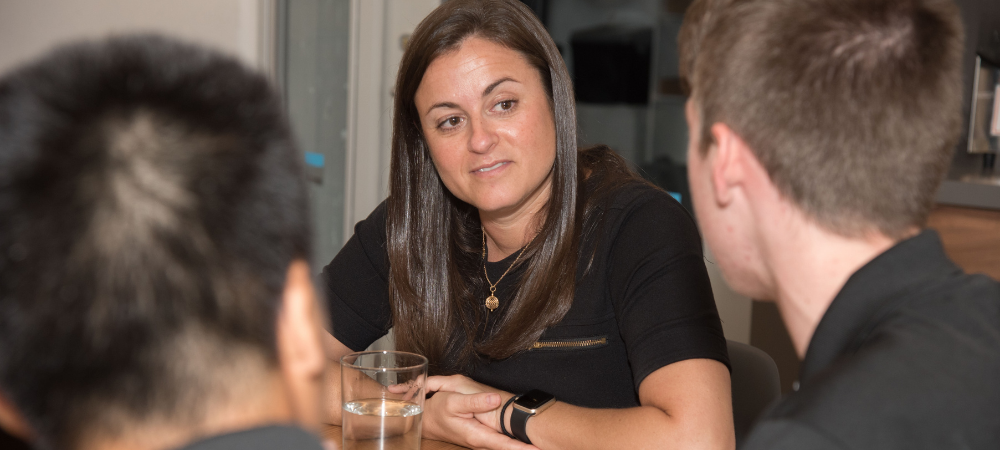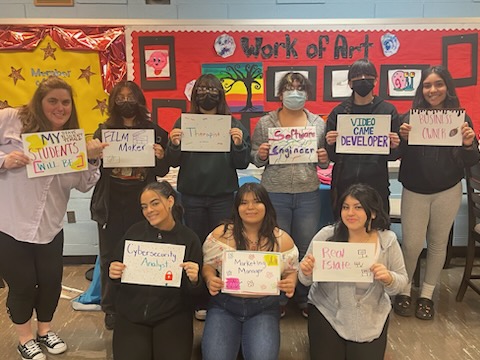3 Tips for Coaching Students in Mentored Industry Projects
Mentored Industry Projects – where teams of students solve industry problems – are powerful opportunities to bring work-based learning (WBL) directly to your classroom. Students get to engage in the challenging, open-ended work of real-world problem solving, the perfect context for developing critical Future Ready Skills.
But what is your role as the facilitator of a Mentored Industry Project? How can you best support your students’ growth? We have a few tips for you, but first a bit of background on District C:
District C has partnered with NAF to provide a framework for Mentored Industry Projects and offer a collection of resources. In our Teamship program, teams of students solve real problems for real businesses, all with the support of a trained and certified facilitator (or coach, as we call them). A number of NAF teachers across the network have been certified to adopt Teamship as their approach for Mentored Industry Projects, and we’re thrilled to be able to support their work!
When we launched Teamship with our first group of students more than six years ago, we realized the easy part was putting students in teams and giving them a problem to solve. The hard part was the coaching – helping them get better at the work. So we committed ourselves to cracking the coaching code. Over the next year, we spent hundreds of hours observing student teams, trying out coaching “moves,” and watching to see what would happen. We threw out the tactics that didn’t work and doubled down on the ones that did. After five or six rounds of trying things, observing, learning, and adapting, we formalized the District C coaching philosophy. We’re still iterating and improving on this philosophy, but we’re convinced that the right kind of coaching at the right time makes all the difference, when it comes to building the durable skills (Future Ready Skills) needed for modern work.
So what have we learned? There’s so much to share, but here are three tips that you might find useful as a starting point:
- Get Specific. In your coaching, steer away from high-level abstractions (eg, “collaborate better with your teammates”) and instead model for students an example of what collaboration looks and sounds like when it’s done well (eg, “You can better understand your teammate’s idea by asking an open-ended follow up question such as, “Can you say more about that insight you had?”). To develop Future Ready Skills, students need to understand how to use these skills at the level of actionable behavior.
- Be Consistent. Provide consistent language when coaching on a skill. A common word or phrase will activate the coaching you’ve done previously and the repetition will help it stick (eg, “Yes! Digging deep! Great job asking a follow-up question to dig deeper!”). In this case, the concept of “digging deeper” could be a refrain that you use at various points during the project to encourage curiosity and objectivity as student teams dig for more understanding. When students hear you say it, they’ll know exactly what you mean.
- Focus on the Positive. As in the example above, reflect students’ good work back to them for encouragement and reinforcement. “Neuroscience shows that we grow most when people focus on our strengths. Learning rests on our grasp of what we’re doing well, not what we’re doing poorly… Focusing people on their shortcomings doesn’t enable learning; it impairs it.” (Harvard Business Review, The Feedback Fallacy, 2019).
If you’re interested in learning more, NAF and District C will be co-hosting a webinar at 3:30 pm EST on October 25th. We will be joined by three exceptional NAF teachers and District C Certified Coaches – Joy Tavano from North Kingstown, RI; Heather Hartmann from Clarence, NY; and Ashley Fahey from Milwaukee, WI – who will share how they’ve adopted Teamship as their Mentored Industry Project framework. You won’t want to miss it!
Click here to register. Hope to see you there!





